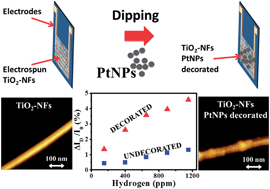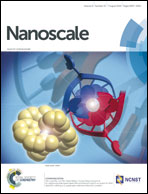Platinum nanoparticles on electrospun titania nanofibers as hydrogen sensing materials working at room temperature†
Abstract
Platinum nanoparticles (PtNPs), with diameters of 3–10 nm, were synthesized by water phase reduction, using 3-mercapto-1-propanesulfonate (3MPS) as a hydrophilic capping agent. PtNPs were deposited by a dipcoating technique on titania nanofibers (TiO2NFs), obtained by electrospinning. The investigated properties of the Pt–TiO2 hybrid at room temperature show that this material combines the properties of photoconduction of titania and the photocatalytic activity of the hybrid. To assess the best performance of Pt–TiO2, different measurements were performed at room temperature, comparing hydrogen response under UV of the uncoated TiO2NFs, compared with the Pt–TiO2 system prepared with two different amounts of PtNPs. During the sensing tests toward hydrogen an enhancement of photoconductivity (150%), an increase in response (400%) and an overall improvement of their dynamic behaviour were observed.


 Please wait while we load your content...
Please wait while we load your content...